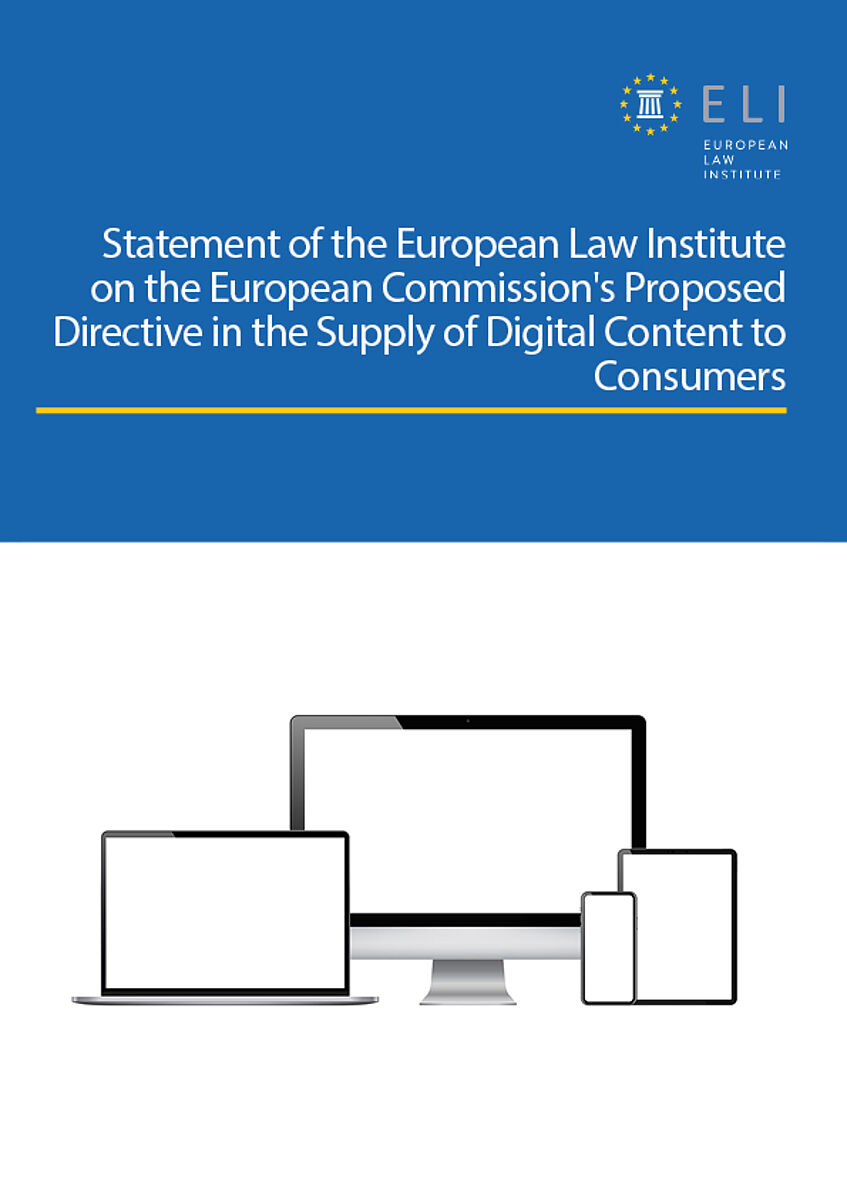ELI Statement of the European Law Institute on the European Commission's Proposed Directive on the Supply of Digital Content to Consumers
Summary
The ELI Statement on the European Commission's Proposed Directive on the Supply of Digital Content to Consumers [COM (2015) 634 final] focused on the proposal of the so-called ‘Digital Content Directive’ (DCD). The Project Team considered that despite the Directive offering important clarity and protection to consumers, room for improvement still existed, therefore it proposed a number of changes to the Directive.
Background & Outcome
After the European Commission withdrew its proposed Regulation on a Common European Sales Law (‘the CESL’) and presented its Digital Single Market Strategy, the ELI set out detailed suggestions on a general approach for a new legislative proposal that would help unlock the potential of the Digital Single Market, in its 2nd Supplement to the ELI Statement on the Proposal for a Regulation on a CESL. On 9 December 2015, the European Commission published three legislative proposals under its Digital Single Market strategy. The successful ELI Conference on New Rules for Contracts in the Digital Single Market provided a first opportunity to discuss and consider the substantial impact that these new Digital Single Market instruments were likely to have. After then the project team scrutinised the instruments with the aim of providing constructive criticism.
The ELI Statement on the European Commission's Proposed Directive on the Supply of Digital Content to Consumers [COM (2015) 634 final] focuses on the proposal of the so called ‘Digital Content Directive’ (DCD). The DCD offers important clarity and protection to consumers, particularly to consumers in Member States (the vast majority) that do not have legislation that specifically applies to contracts for the supply of digital content. In this Statement, the project team identifies a number of issues where it believes the draft DCD still needs to be improved.
The ELI project on Common European Sales Law was initiated in response to the Proposal for a Regulation of the European Parliament and of the Council on a Common European Sales Law, published by the European Commission on 11 October 2011. Taking advantage of extensive debates with experts from various legal fields and traditions, the Working Group under the auspices of the ELI prepared a Statement on the Commission’s Proposal. The Statement was approved on 7 September 2012 by the ELI Council and published on the ELI website. The Working Group resumed its work in order to react to the European Parliament’s Legislative Resolution and prepared a 1st Supplement to that Statement, which was published in 2014.
In May 2015, the European Commission adopted a Digital Single Market Strategy. The ELI welcomed this development and in order to refer to the European Commission’s change of approach, the ELI Working Group prepared a 2nd Supplement to the Statement of the ELI on the Proposal for a Regulation on a CESL. The Supplement sets out the approach, which the Working Party concluded in April 2015 and forms the first part of what will be a longer-term project within which the ELI might develop a detailed draft legislative proposal.
The document aims at providing clear recommendations for the EU Institutions in terms of how to further develop the Proposal for the Digital Single Market. The Working Group underlined, that the Proposal has to be drafted in as clear and as straightforward a way as possible, provide a high level of customer protection and place a focus on legal certainty.
The project leading to the elaboration of the project's output was supported by the European Union.
Project Reporters
- John Sorabji
- John Thomas
- Christiane Wendehorst
Drafting Committee
- Hugh Beale
- Axel Metzger
- Reiner Schulze
- Hans Schulte-Nölke
- Christiane Wendehorst
- Fryderyk Zoll
Working Group
- Fabrizio Cafaggi
- Bénédicte Fauvarque-Cosson
- Johan Gernandt
- Paul Gilligan
- Paola Iamiceli
- Rafael Illescas
- Peter Limmer
- Marco Loos
- Matthias Storme
- Diana Wallis
- Friedrich Graf Von Westphalen
Advisory Committee
- Remo Caponi
- Sjef van Erp
- Ole Lando
- Hans Micklitz
- Lajos Vekas
- Carole Aubert de Vincelles
- Lajos Vekas

